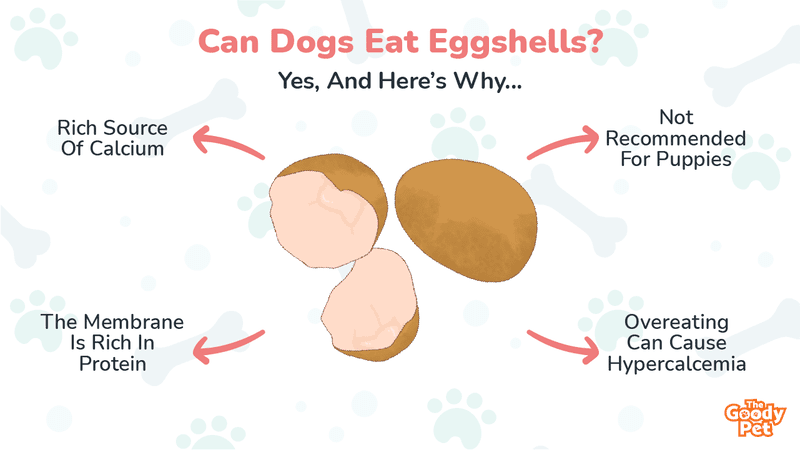Whipping up an egg-based meal? What if some eggshells fall on the ground and your dog acts way faster than you, eating those crunchy eggshells without your approval, or should you worry or not?
No worries because eggshells won’t cause any major health problems to your fur baby unless you give too much.
Eggshells are sources of essential minerals like calcium, but be wary because too much calcium can have negative effects known as hypercalcemia. This condition may cause excessive thirst and bladder stones.
Eggs are part of the superfoods, and it’s interesting to learn the benefits of feeding eggshells to our fur babies. What’s the best way to serve eggshells – raw or cooked? How much are too many eggshells?
Let’s start cracking and reveal to you the important information you have been missing out about eggshells.
Can Dogs Eat Eggshells?

Yes, dogs can be given eggshells but only in moderation. Plus, eggshells are great sources of essential minerals such as calcium, phosphorus, magnesium, and amino acids.
Eggshells can also provide your dog with additional vitamins for its overall wellness.
Calcium
Eggshells can give the milk a run for its money when it comes to calcium content.
The grainy and bumpy texture of eggshells is composed of about 17,000 tiny pores and is mainly made of calcium carbonate or CaCO₃ crystals.
It is a calcium carbonate that is responsible for strengthening the teeth and bones of adult dogs.
Additionally, calcium carbonate also plays a major role in preventing clotting, maintaining a healthy vision and muscle function, plus a host of other essential body functions.
If your fur baby is on a homemade diet, you should add 20% raw and meaty food for its daily calcium needs. Since not all fur parents are open to the idea of feeding raw meat or bones, powdered eggshells are the better option as a calcium supplement.
Phosphorus
This mineral works side-by-side with calcium carbonate to help strengthen the bones and teeth.
Aside from this function, phosphorus plays an important role in the healthy maintenance of the nervous system, muscle growth, as well as in blood coagulation.
Phosphorus also protects the kidneys by flushing out toxins and repairing the body cells.
Additionally, phosphorus functions by assisting muscle contraction for proper motor functions such as running, walking, and chewing.
Magnesium
Without an adequate amount of magnesium, our dogs’ bodies wouldn’t be able to absorb calcium.
Magnesium is needed for muscles and nerves to function normally, promotes a healthy immune system, and helps the heartbeat at a steady pace.
Amino Acids
The hidden benefits of eggshells are not just about strengthening bones and teeth.
Eggshells contain an average of 8 amino acids that assist in lowering blood pressure, keeping the heart healthy, and lowering blood sugar levels.
Vitamin E
An essential vitamin that can reduce the effects of aging, such as cognitive deterioration. Plus, of course, vitamin E keeps our dogs looking fab, even in old age, because it promotes healthy skin and coats.
Apart from the aforementioned vitamin and minerals, you may not know this but eggshells can also provide your fur baby with the following:
- Vitamin B6 for brain development
- Folic acid for healthy cells
- Fluoride for oral health
- Strontium for healthy bones
- Selenium to avoid cell damage
What About Puppies, Can They Eat Eggshells?
Generally speaking, it’s best not to give puppies eggshells unless a vet has given the green light.
Additional calcium may not be necessary as long as the puppies are eating high-quality dog food.
It may be necessary if they are fed homemade food, but a vet’s approval is highly recommended. They’d be able to calculate the amount of calcium needed.
A vet’s recommendation is done to avoid excessive amounts of calcium that can lead to skeletal problems among growing puppies.
What About Eggshell Membranes, Are These Safe For Dogs?
For dogs that suffer from arthritis and joint pains, you’d be surprised, but, yes, eggshell and eggshell membranes are proven effective in easing their pains and improving mobility.
An eggshell membrane is the clear mucous found in the lining of the eggshells and is made up of protein.
And, since eggshell membranes also have a high calcium content, these are now being incorporated for arthritic treatments for dogs.
How Many Eggshells Should A Dog Have?

The safest amount of powdered eggshells is ¼ teaspoon for every half-pound of food, which equates to 500 mg of calcium.
In case you’ve got no idea how much calcium an egg contains, one large eggshell can be pulverized into one teaspoon of eggshell powder, which is about 2 g of calcium.
If your fur baby is eating high-quality dog food, there is no need to supplement its diet with extra calcium.
Otherwise, the amount of powdered eggshells depends on factors like size, age, existing health condition, as well as your dog’s lifestyle.
It’s best to talk to a vet to find out how many eggshells can be given to your fur baby. Too much of this can be detrimental, which we’re going to talk about in a bit.
In the meantime, we’ll teach you how to make eggshell powder as a calcium supplement.
How To Prepare Eggshell Calcium For Dogs
Please take note that nothing beats organic or farm-bought eggs as these are devoid of chemicals.
Wash and dry a dozen eggshells. Spread the shells on a baking tray and place them in a preheated oven at 200 °F for about 10 minutes. The goal is to just dry the eggshells and not burn them.
Cool the eggshells and then pulverize them using a coffee grinder, a food processor, or mortar and pestle. Grind the eggshells well to ensure that there are no remaining sharp edges.
Place the powdered eggshells in an airtight container to prevent moisture from seeping in. The powdered eggshells have a shelf life of 2 months, provided that these won’t get wet and moldy.
Can Eating Eggshells Hurt A Dog?
Yes, too many eggshells can cause hypercalcemia. And, there’s always the risk of getting contracted salmonella poisoning if you feed your fur baby with raw eggshells.
Hypercalcemia
As the saying goes, ‘too much of the good thing is bad’ can be applied to feeding too many eggshells to your dog.
Hypercalcemia is a condition where there is a high level of calcium in the blood. Dogs that are having excessive amounts of calcium may show signs like loss of appetite, increased thirst and urination, and listlessness.
If not addressed properly may eventually cause kidney or bladder stones.
Again, we want to stress that if your dog is on high-quality commercially-prepared dog food, you do not have to supplement its diet with calcium such as eggshells.
Salmonella Poisoning
There are some exceptions when feeding dogs with eggshells, especially when raw eggs are contaminated with salmonella.
A few steps on the proper cooking of eggshells will ensure that there is no risk of salmonella contamination.
Plus, of course, it’s a good habit to grind the eggshells very well so there’d be no traces of sharp edges that may scratch your dog’s throat, worse, cause choking.
Lastly, if your dog managed to steal some uncooked eggshells from the counter, it’s a good idea to watch out if it begins to show signs of allergic reactions. Most of the time, though, there’d be no major issues.






